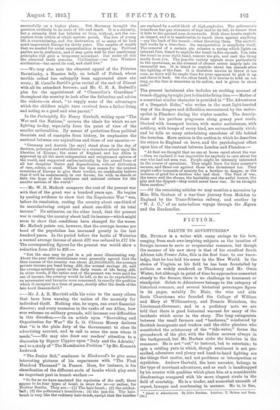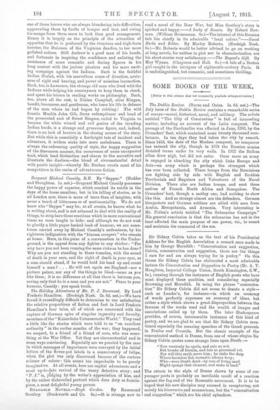FICTION.
SALUTE TO ADVENTURERS.*
Mn. BUCHAN is a writer with many strings to his bow, ranging from such awe-inspiring subjects as the taxation of foreign income to eerie or crepuscular romance, but though the manner of his new story is that of his excellent South African tale Prestcr John, this is the first time, to our know. ledge, that he has laid, his scene in the New World. In the choice of Virginia as his field he has been forestalled by authors as widely sundered as Thackeray and Mr. Owen Wister, but although in point of time he approaches somewhat closely to the former, there is no challenge in treatment or standpoint. Salute to Adventurers belongs to the category of historical romance, and several historical personages figure in its pages, notably Dr. Blair, the wise and able Scots Churchman who founded the College of William and Mary at Williainsbury, and Francis Nicholson, the Lieutenant-Governor; and in a prefatory note we are told that there is good historical warrant for many of the incidents which occur in the story. The long antagonism between the small farmers and " borderers," reinforced by Scottish immigrants and traders and the older planters who constituted the aristocracy of the " tide-water," forms the groundwork of the plot, with the Indian menace always in the background, but Mr. Buchan sinks the historian in. the romancer. He is not "out" to instruct, but to entertain; to spin a rattling yarn in -which, though sentiment is not pro- scribed, adventure and piracy and hand-to-hand fighting are the things that matter, and not problems or introspection or mysticism, Andrew Garvald, the hero narrator, belongs to the type of merchant adventurer, and as such is handicapped by his creator with qualities which place him at a considerable disadvantage compared with his more elegant rivals in the field of courtship. He is a trader, and somewhat uncouth of aspect, brusque and overbearing in manner. He is, in fine, * &tato tc Aduenturers. By John Buchan. Lontlan: T. Nelson and Sons. tee.] one of those heroes who are always blundering into difficulties, aggravating them by faults of temper and tact, and owing his escape from them more to luck than good management. Hence it is largely on the principle of the attraction of opposites that he is preferred by the vivacious and high-born heroine, the Dulcinea of the Virginian dandies, to her more polished suitors. Still Andrew is a good man of his hands, and fortunate in inspiring the confidence and enlisting the assistance of more romantic and daring figures in his long contest with the jealous planters and his more excit- ing campaign against the Indians. Such is the faithful Indian Shalah, with his marvellous sense of direction, acute- ness of sight and hearing, and power of noiseless locomotion. Such, too, is Lawrence, the strange old man who lived with the Indians while helping his countrymen to keep them in check, and spent his leisure in reading works on philosophy. Such, too, above all the rest, is Ninian Campbell, alias Ringan, bandit, buccaneer, and gentleman, who loses his life in defence of the man whom he had begun by robbing I The wild fanatic Mackie John Gib, Scots redemptioner and head of the persecuted sect of Sweet Singers, exiled to Virginia to become the white wizard and evil genius of the invading Indian horde, is a strange and gruesome figure, and, indeed, there is no lack of horrors in the closing scenes of the story. But while this is essentially a forthright tale of incident and adventure, it seldom sinks into mere melodrama. There is always the redeeming quality of style, the happy suggestion of the Stevenson manner, the occurrence of some unexpected trait, which lend distinction and charm to the narrative and illustrate the dualism—the blend of circumstantial detail with poetic insight—whereby Mr. Buchan excels most of his competitors in the realm of adventurous fiction.



































 Previous page
Previous page